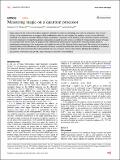Measuring magic on a quantum processor
Author(s)
Oliviero, Salvatore F. E.; Leone, Lorenzo; Hamma, Alioscia; Lloyd, Seth
Downloads41534-022-00666-5.pdf (1.122Mb)
Publisher with Creative Commons License
Publisher with Creative Commons License
Creative Commons Attribution
Terms of use
Metadata
Show full item recordAbstract
Magic states are the resource that allows quantum computers to attain an advantage over classical computers. This resource consists in the deviation from a property called stabilizerness which in turn implies that stabilizer circuits can be efficiently simulated on a classical computer. Without magic, no quantum computer can do anything that a classical computer cannot do. Given the importance of magic for quantum computation, it would be useful to have a method for measuring the amount of magic in a quantum state. In this work, we propose and experimentally demonstrate a protocol for measuring magic based on randomized measurements. Our experiments are carried out on two IBM Quantum Falcon processors. This protocol can provide a characterization of the effectiveness of a quantum hardware in producing states that cannot be effectively simulated on a classical computer. We show how from these measurements one can construct realistic noise models affecting the hardware.
Date issued
2022-12-19Department
Massachusetts Institute of Technology. Department of Mechanical EngineeringJournal
npj Quantum Information
Publisher
Springer Science and Business Media LLC
Citation
Oliviero, S.F.E., Leone, L., Hamma, A. et al. Measuring magic on a quantum processor. npj Quantum Inf 8, 148 (2022).
Version: Final published version
ISSN
2056-6387
Keywords
Computational Theory and Mathematics, Computer Networks and Communications, Statistical and Nonlinear Physics, Computer Science (miscellaneous)